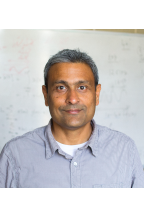Sriram Narasimhan

Contact information
Website
Sriram NarasimhanBiography summary
Dr. Sriram Narasimhan is a Professor in the departments of Civil and Environmental Engineering & Mechanical and Mechatronics Engineering at the University of Waterloo in Waterloo, Ontario, Canada, where he also holds the title of Canada Research Chair in Smart Infrastructure. Dr. Narasimhan’s main research areas are in structural dynamics, system identification and condition assessment of structural and mechanical systems. He received his PhD in 2005 from Rice University in the area of control of base isolated structures. Subsequently, he joined the University of Waterloo in 2006 as a tenure-track Assistant Professor, where he was promoted to the rank of tenured Associate Professor in 2012. Prior to joining the University of Waterloo, Dr. Narasimhan was with with the Risk Consulting Division at the American Bureau of Shipping in Houston, Texas, USA. Dr. Narasimhan is active in various international technical committees and is currently an Associate Editor for the ASCE Journal of Bridge Engineering and ASCE Journal of Structural Engineering. He also serves on the editorial board of the Journal of Structural Control and Health Monitoring. He serves as a reviewer for several international scientific journals and is a registered professional engineer in the province of Ontario in Canada.
Research interests
- Structural Dynamics
- Structural Control
- Structural Vibrations
- System Identification
- Structural Health Monitoring
- Earthquake Engineering
- Vibration Control
- Structural reliability and risk
- Structures
- Mechanics & Construction
- Advanced Manufacturing
- Smart Infrastructure
Education
- 2005, Doctorate, Civil/Structural Engineering, Rice University
- 2000, Master's, Structural Engineering, Louisiana State University
- 1996, Master's, Coastal Engineering, Asian Institute of Technology
- 1993, Bachelor's, Civil Engineering, Osmania University, Hyderabad
Selected/recent publications
- Hazra, Budhaditya and Narasimhan, Sriram, Gearbox Fault Detection Using Synchro-squeezing Transform, Procedia Engineering, 144, 2016, 187 - 194
- Sadhu, Ayan and Prakash, Guru and Narasimhan, Sriram, A hybrid hidden Markov model towards fault detection of rotating components, Journal of Vibration and Control, 2016
- Hazra, B and Sadhu, A and Narasimhan, S, Fault detection of gearboxes using synchro-squeezing transform, Journal of Vibration and Control, 2016
- Dey, P and Sychterz, A and Narasimhan, S and Walbridge, S, Performance of pedestrian-load models through experimental studies on lightweight aluminum bridges, Journal of Bridge Engineering, 2016
- Kheirkhah, Sina and Yarusevych, Serhiy and Narasimhan, Sriram, Wake Topology of a Cylinder Undergoing Vortex-Induced Vibrations With Elliptic Trajectories, Journal of Fluids Engineering, 138(5), 2016
In the news
Graduate studies
- Currently considering applications from graduate students. A completed online application is required for admission; start the application process now.